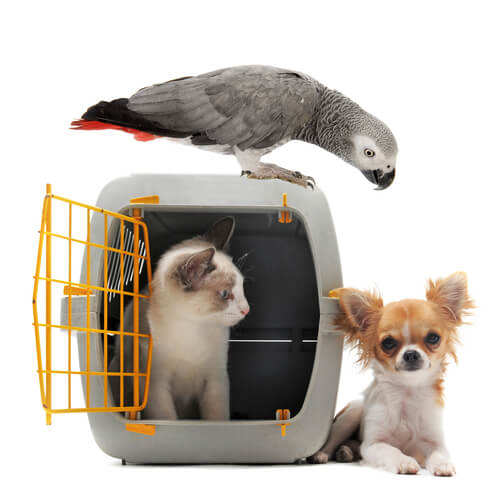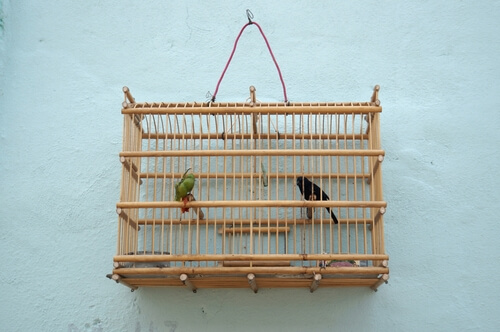Traveling with Your Birds: 5 Key Tips


Written and verified by the lawyer Francisco María García
When vacations approach, many people begin to wonder how best to travel with their pets, whether by car, motorbike, or plane. Although dogs and cats are the most frequent ‘traveling’ companions, birds often accompany their owners. Here are some tips for traveling with your birds safely.
5 key things to consider before traveling with your birds
Recognizing your pet’s character
It’s important to consider the character of our pets before subjecting them to a change of setting and routine. This applies to all species, including domestic birds.
Each animal species and each individual has its own physical and behavioral characteristics. A bird won’t have the same character as a dog, and they are even many differences from bird to bird. All of these aspects are important when deciding whether to travel with your birds or leave them in the care of others.
If your bird has a sociable nature and good physical stamina, taking it on vacation with you may be an excellent idea. But if it’s a rather fragile or less sociable bird, a change of setting or routine may be detrimental to its health and behavior. You need to carefully consider if it’s a responsible and safe decision.
If you’re not sure about your pet’s character or its specific needs, then the ideal thing is to consult a specialized veterinarian. The expert will be able to guide each owner in deciding whether or not to take their pet on vacation.
Choosing the most suitable carrier for your bird
After deciding to travel with your birds, the first step is to ensure their safety and comfort throughout the journey. The safest way to transport your bird is to purchase a cage or carrier.

There are several options available in pet stores, and it’s important to choose the right one for your pet. To ensure a good decision, it’s essential to consider your bird’s size, behavior, age, and health.
Having chosen the ideal carrier, it’s time to fit it out for your bird, to ensure their well-being. Your pet will spend long hours there and so it’ll need to find ways to amuse itself, as well as to relieve itself. Also, on a long car trip, a feeder and waterer will be essential in order to prevent dehydration.
Make sure of the ideal place to go on vacation with your birds
For true travelers, just about anywhere is ideal in order for us to expand our knowledge and enjoy ourselves. However, if we travel with our pets, we must be a little more prudent in the choice of our destination.
Not all species have a great capacity to adapt and the sudden change of environment can be very harmful. To choose the most suitable place for your bird it’s important to consider the climate, humidity, available space, presence of other animals, etc.
On the other hand, it’s also essential to think about whether we’ll have enough time to take care of our pets during our vacations. Traveling with your birds implies a lot of responsibility and specific care to look after their welfare. It isn’t good for your bird for you to take it with you and then leave it alone all the time.

Respect your bird’s adaptation time to the carrier
Adaptation is a gradual process and each animal has its own time to feel comfortable and safe in a new environment. Before traveling with your birds, it’ll be essential to set aside a few weeks for them to adapt to their carrier.
This process requires patience and positive reinforcement from each owner. At first, the ideal thing is to leave the bird in the carrier for only a few minutes (or seconds, depending on the animal’s reaction). Then, we reward its good behavior with a treat of its choice; little by little, the bird will understand that this environment is safe.
Consult a veterinarian before traveling with your birds
Before traveling with your birds, you should consult a veterinarian to confirm their health status. Preventive medicine is also something you need to take into account in your bird’s life.
To preserve your bird’s well-being throughout the year, follow these guidelines:
- Regular visits, every 6 months, to a specialized veterinarian
- Regular vaccinations and deworming
- A complete and balanced nutrition according to the nutritional requirements of each species
- Physical and mental stimulation
- Sustainable hygiene habits
When vacations approach, many people begin to wonder how best to travel with their pets, whether by car, motorbike, or plane. Although dogs and cats are the most frequent ‘traveling’ companions, birds often accompany their owners. Here are some tips for traveling with your birds safely.
5 key things to consider before traveling with your birds
Recognizing your pet’s character
It’s important to consider the character of our pets before subjecting them to a change of setting and routine. This applies to all species, including domestic birds.
Each animal species and each individual has its own physical and behavioral characteristics. A bird won’t have the same character as a dog, and they are even many differences from bird to bird. All of these aspects are important when deciding whether to travel with your birds or leave them in the care of others.
If your bird has a sociable nature and good physical stamina, taking it on vacation with you may be an excellent idea. But if it’s a rather fragile or less sociable bird, a change of setting or routine may be detrimental to its health and behavior. You need to carefully consider if it’s a responsible and safe decision.
If you’re not sure about your pet’s character or its specific needs, then the ideal thing is to consult a specialized veterinarian. The expert will be able to guide each owner in deciding whether or not to take their pet on vacation.
Choosing the most suitable carrier for your bird
After deciding to travel with your birds, the first step is to ensure their safety and comfort throughout the journey. The safest way to transport your bird is to purchase a cage or carrier.

There are several options available in pet stores, and it’s important to choose the right one for your pet. To ensure a good decision, it’s essential to consider your bird’s size, behavior, age, and health.
Having chosen the ideal carrier, it’s time to fit it out for your bird, to ensure their well-being. Your pet will spend long hours there and so it’ll need to find ways to amuse itself, as well as to relieve itself. Also, on a long car trip, a feeder and waterer will be essential in order to prevent dehydration.
Make sure of the ideal place to go on vacation with your birds
For true travelers, just about anywhere is ideal in order for us to expand our knowledge and enjoy ourselves. However, if we travel with our pets, we must be a little more prudent in the choice of our destination.
Not all species have a great capacity to adapt and the sudden change of environment can be very harmful. To choose the most suitable place for your bird it’s important to consider the climate, humidity, available space, presence of other animals, etc.
On the other hand, it’s also essential to think about whether we’ll have enough time to take care of our pets during our vacations. Traveling with your birds implies a lot of responsibility and specific care to look after their welfare. It isn’t good for your bird for you to take it with you and then leave it alone all the time.

Respect your bird’s adaptation time to the carrier
Adaptation is a gradual process and each animal has its own time to feel comfortable and safe in a new environment. Before traveling with your birds, it’ll be essential to set aside a few weeks for them to adapt to their carrier.
This process requires patience and positive reinforcement from each owner. At first, the ideal thing is to leave the bird in the carrier for only a few minutes (or seconds, depending on the animal’s reaction). Then, we reward its good behavior with a treat of its choice; little by little, the bird will understand that this environment is safe.
Consult a veterinarian before traveling with your birds
Before traveling with your birds, you should consult a veterinarian to confirm their health status. Preventive medicine is also something you need to take into account in your bird’s life.
To preserve your bird’s well-being throughout the year, follow these guidelines:
- Regular visits, every 6 months, to a specialized veterinarian
- Regular vaccinations and deworming
- A complete and balanced nutrition according to the nutritional requirements of each species
- Physical and mental stimulation
- Sustainable hygiene habits
This text is provided for informational purposes only and does not replace consultation with a professional. If in doubt, consult your specialist.








